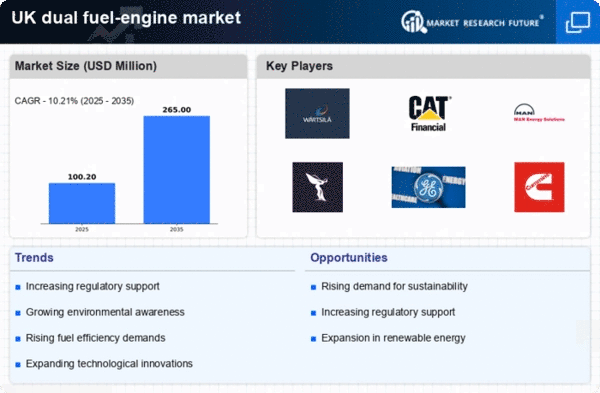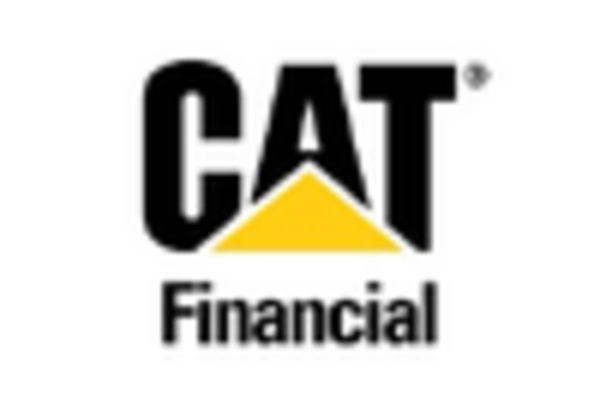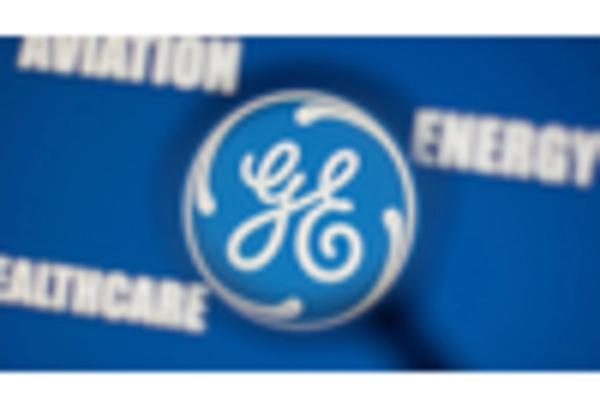Rising Fuel Prices
The dual fuel-engine market is experiencing a surge in interest due to rising fuel prices in the UK. As traditional fuel costs escalate, businesses and consumers are increasingly looking for cost-effective alternatives. Dual fuel engines, which can operate on both diesel and natural gas, offer a potential solution by allowing users to switch fuels based on price fluctuations. This flexibility can lead to substantial savings, particularly in sectors such as transportation and logistics, where fuel costs represent a significant portion of operational expenses. According to recent data, the average price of diesel has risen by approximately 15% over the past year, prompting a shift towards dual fuel technologies. Consequently, the dual fuel-engine market is likely to expand as more stakeholders seek to mitigate the impact of fuel price volatility.
Increased Demand for Energy Efficiency
Energy efficiency is becoming a critical focus in the UK, driving growth in the dual fuel-engine market. As businesses and consumers alike strive to reduce energy consumption and operational costs, dual fuel engines present an attractive option. These engines are designed to optimize fuel usage, thereby enhancing overall efficiency. The UK government has set ambitious targets for energy efficiency improvements across various sectors, which aligns with the capabilities of dual fuel technologies. For instance, the Energy Savings Opportunity Scheme (ESOS) encourages organizations to assess their energy usage and implement measures to improve efficiency. This regulatory push is likely to bolster the dual fuel-engine market, as companies seek to adopt technologies that not only comply with regulations but also contribute to their bottom line.
Growing Awareness of Environmental Impact
There is a growing awareness of the environmental impact of traditional fuel sources in the UK, which is propelling the dual fuel-engine market forward. As public consciousness regarding climate change and air quality issues increases, both consumers and businesses are seeking cleaner alternatives. Dual fuel engines, which can utilize natural gas alongside diesel, are perceived as a more environmentally friendly option. This shift in consumer preference is supported by various campaigns and educational initiatives aimed at promoting sustainable practices. The dual fuel-engine market is likely to see a rise in demand as stakeholders respond to this heightened awareness, leading to increased investments in cleaner technologies and practices.
Regulatory Support for Emission Reduction
The dual fuel-engine market benefits from robust regulatory frameworks aimed at reducing emissions in the UK. The government has implemented stringent regulations that mandate lower emissions from vehicles and industrial engines. This regulatory support encourages manufacturers to innovate and adopt dual fuel technologies, which can significantly reduce harmful emissions. For instance, the UK aims to achieve net-zero greenhouse gas emissions by 2050, which necessitates a shift towards cleaner technologies. The dual fuel-engine market is likely to see increased demand as companies seek to comply with these regulations. Furthermore, incentives such as tax breaks and grants for adopting cleaner technologies may further stimulate market growth, making it a pivotal driver in the dual fuel-engine market.
Technological Innovations in Engine Design
Technological advancements in engine design are significantly influencing the dual fuel-engine market. Innovations such as improved fuel injection systems and advanced control technologies enhance the performance and efficiency of dual fuel engines. These developments enable better combustion processes, leading to reduced emissions and increased power output. The UK is home to several research institutions and automotive manufacturers that are actively engaged in developing cutting-edge technologies for dual fuel applications. As these innovations become more prevalent, they are expected to drive adoption rates in various sectors, including transportation and marine applications. The dual fuel-engine market stands to benefit from these technological breakthroughs, as they not only improve engine performance but also align with the growing demand for sustainable solutions.

















